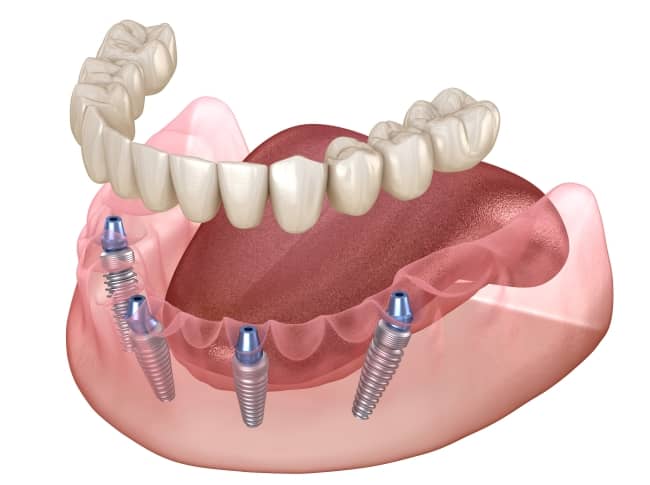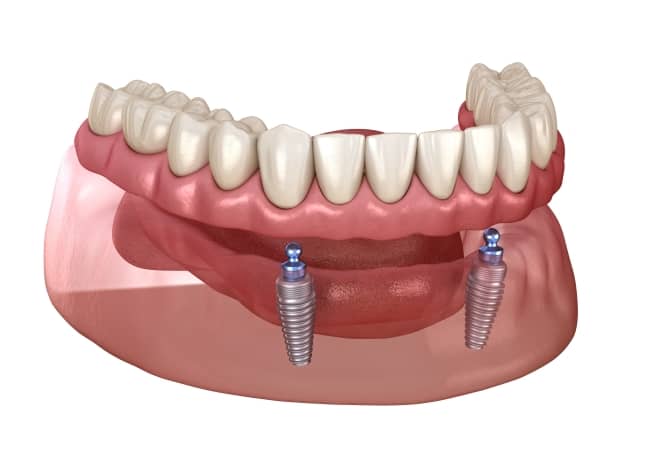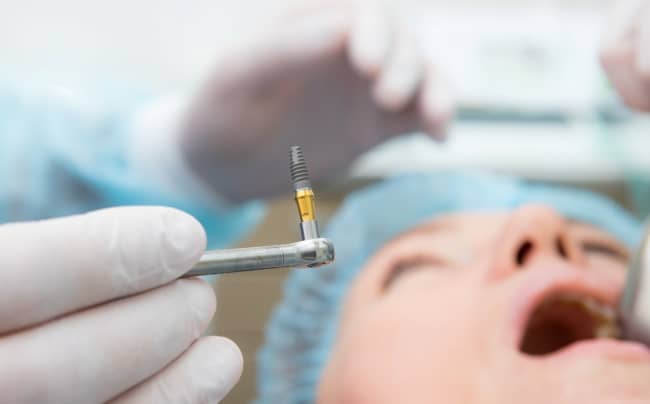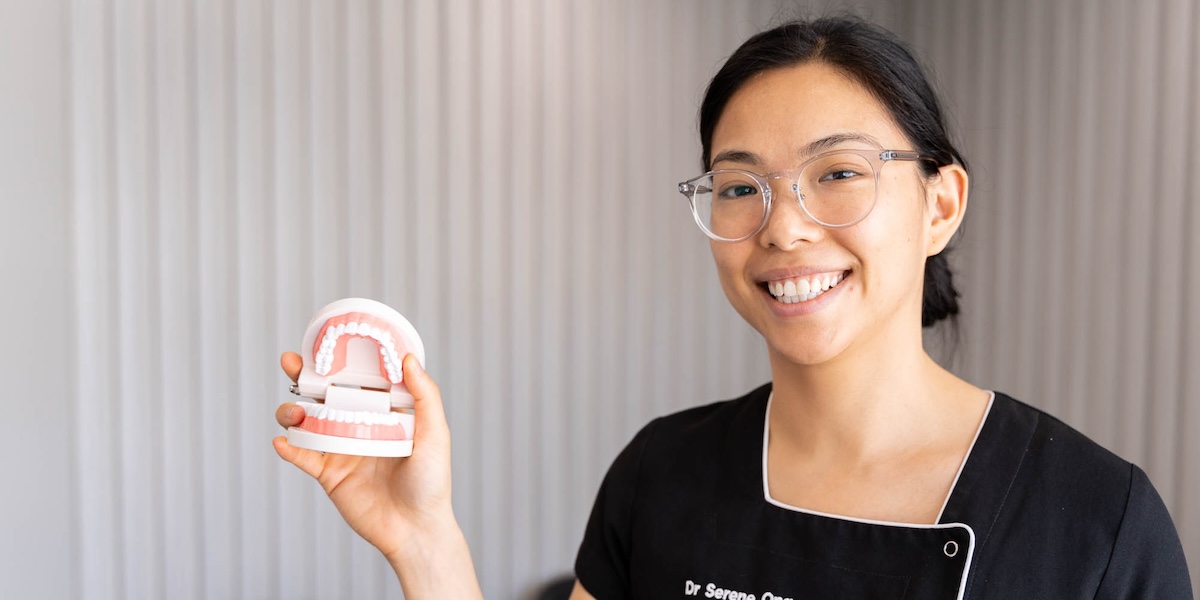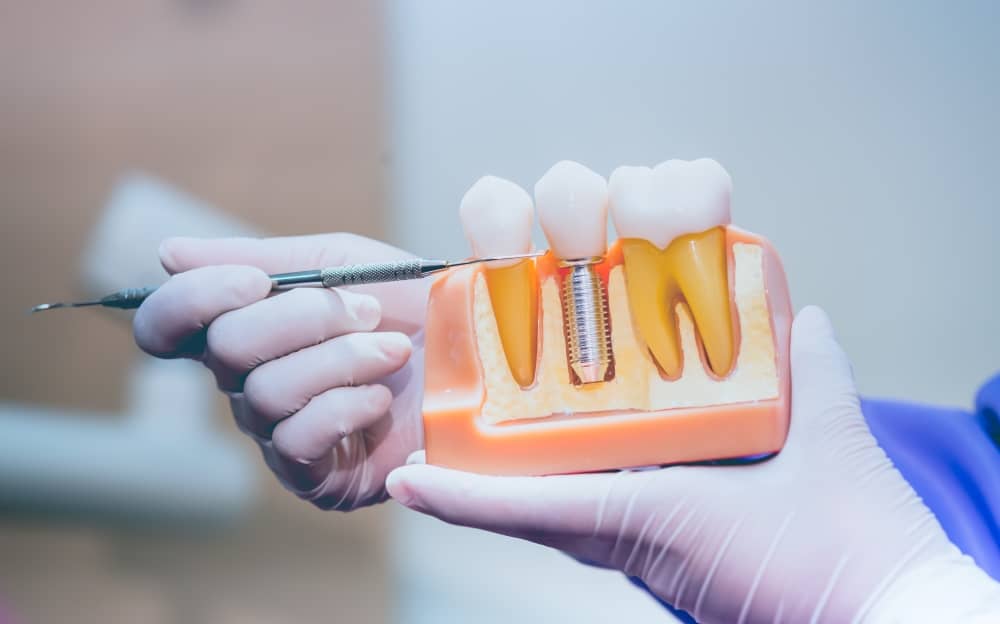
What Are Dental Implants and What Are the Different Types?
Dental implants are becoming increasingly popular in Australia as an effective replacement for missing teeth.
If you are curious about dental implants and if they are right for you, read on to find out about the different types of dental implants and how they can benefit your oral health.
What Are Dental Implants?
A dental implant is a small, titanium post that serves as a replacement for the root of a missing tooth. It is surgically placed into the jawbone, where it fuses with the bone over time. This fusion creates a stable foundation to support artificial teeth, such as crowns, bridges, or dentures, which are attached to the implant via an abutment.
Dental implants offer a durable and long-term solution for tooth loss, preserving jawbone health and providing a look and function similar to natural teeth. This results in a replacement tooth that looks and acts just like a natural tooth and can last for up to 20 years.
Dental implants involve three parts:
- The implant, typically made from titanium, acts as the artificial tooth root
- The abutment (the metal part that connects the dental crown to the implant)
- The crown (the artificial replacement tooth, usually made from porcelain)
Related Reading: 10 Things to Know About Dental Implants
What Are the Different Types of Dental Implants?
Dental implants are constructed from a variety of materials, usually porcelain or ceramic, that get fused to metal. A tooth-shaped cap that matches your surrounding teeth is attached to the artificial root and integrated into the jawbone as it heals.
Here, I’ll explain the common types of dental implants.
Single Tooth Implants
Dental implants are an excellent solution for individuals who only want to replace a single missing tooth. A single-tooth dental implant consists of a surgically implanted metal post, an abutment, and a crown that matches your surrounding teeth. A single-tooth implant is an excellent way to replace a missing tooth and restore the look and function of your smile.
To create a single-tooth dental implant, your dentist will take exact measurements of your natural teeth and create a customised crown that will look and function like your surrounding teeth.
A single-tooth implant offers a variety of oral health benefits, including stimulating the jawbone to help prevent bone deterioration. Replacing a missing tooth also ensures that food and debris cannot build up in the gap left behind by the missing tooth.
All-On-Four Dental Implants
If a patient has several missing teeth, all-on-four dental implants can be an effective solution. This tooth replacement procedure focuses on permanent tooth restoration for the entire lower and upper jaw. It offers the added convenience of being removable for cleaning, by your dentist, as necessary.
Implant-Supported Bridgework
Another solution for patients who are missing several teeth is implant-supported bridgework, also known as fixed bridges. This process involves a dental bridge that gets attached to the surrounding teeth on both sides of the gap. This provides a great deal of stability and prevents the patient from needing to remove the implants daily, as opposed to dentures.
Implant-supported bridgework provides a result that looks, acts, and feels like natural teeth. This process also eliminates the need to reshape existing teeth. However, if the gap is too much to span or if the surrounding teeth are not healthy enough to support the bridgework, your dentist will discuss an alternative option with you.
Implant-Supported Dentures
Missing teeth can result in bone loss or infection, making it important to find a tooth loss solution that is right for you. Some patients benefit from implant-supported dentures if they are missing several teeth.
Implant-supported dentures are fixed to the implant with screws, creating a stable, long-lasting solution for missing teeth. Implant-supported dentures can be removed by your dentures for a thorough cleaning, although users should not take implant-supported dentures out on their own.
Endosteal vs. Subperiosteal Dental Implants
Endosteal Implant
Endosteal implants refer to dental implants that are placed inside the bone. Typically, titanium is used for the artificial metal root since it is biocompatible and less likely to be rejected by the body.
After the surgical insertion, the metal screw fuses to the jawbone as it heals, a process known as osseointegration. Once the fusion occurs, the abutment will be installed.
Subperiosteal Implant
If a patient does not have enough bone to support an endosteal implant, they may be evaluated for a subperiosteal implant. Subperiosteal implants sit above the jawbone, just below the gum line. This does not require surgical placement but lacks the stability and security of an endosteal implant. Your dentist will discuss the ideal solution for you.
What Are the Advantages of Dental Implants?
The benefits of dental implants include:
- Do not require alterations to the surrounding teeth
- Are comfortable, secure, and stable
- Safe and effective
- Look, act, and feel like normal teeth
- Offer a long lifespan — up to 15 to 20 years
- Allow you to enjoy your favourite foods with confidence and chew comfortably
- Fill in the gap left behind by a missing tooth to ensure the area does not trap debris or food and lead to infection or gum disease
- Low maintenance and easy to care for (just follow a good oral hygiene routine)
- Help prevent age-related changes and bone loss in the jaw
- Offer a high success rate — one of the highest compared to other tooth restoration procedures (up to 97% or even higher)
- Dental implant material does not decay
- Better stability than dentures or bridges
- Do not feel bulky inside the mouth or affect speech
Related Reading: A Guide to Dental Implants
Dental Implants vs. Dental Bridges
Although dental bridges are an effective solution for missing teeth, dental implants do not require alterations to the surrounding teeth. Dental implants also offer increased stability and security. Your dentist will help you decide whether dental bridges or dental implants are the right solutions for your missing tooth or teeth.
What Does A Dental Implant Procedure Involve?
Getting a dental implant is a straightforward oral surgery procedure that can be completed in approximately two to three visits.
The dental implant procedure involves:
- Dental scans and X-rays to evaluate your oral health and the integrity of your jawbone
- Surgical placement of the titanium post into the jawbone (this surgery only involves the use of a local anaesthetic rather than general anaesthesia)
- The screw begins to fuse to the jawbone during the healing process (this typically takes several months)
- During the healing phase, a temporary crown is placed
- After osseointegration is complete and the dental implant is stabilised, a customised, permanent dental crown that matches your natural teeth is placed
- A follow-up procedure allows your dentist to ensure the crown and implant are secure and functioning as they should
Who Is A Good Candidate For Dental Implants?
The ideal candidate for dental implants should:
- Have good overall health
- Have adequate jaw bone density and good jaw bone structure
- Have good oral hygiene, and good oral health
- Have healthy gums
- Be free of bone loss issues, oral health conditions, or periodontitis
Are You a Candidate for Dental Implants?
Dental implants are a safe, effective, long-lasting solution to missing teeth. If you live in Perth and want to find out if you are a good candidate for dental implants and what type of dental implant would be best for you, get in touch with the dentist Canning Vale trusts today.
I am happy to answer all of your questions or set up a consultation for you to find out if dental implants are the right choice for you.
